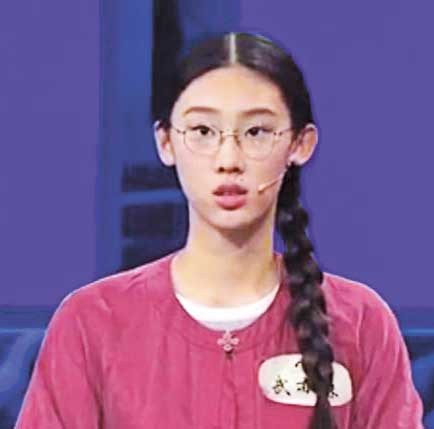Televised poetry contest promises literary spring
 0 Comment(s)
0 Comment(s) Print
Print E-mail Xinhua, February 13, 2017
E-mail Xinhua, February 13, 2017
|
|
|
Wu Yishu is now a social media icon. |
A televised poetry competition during the Spring Festival holiday was watched by more people in China than many star-studded soap operas, festive galas and reality shows.
Has the country suddenly found new passion for classical literature? Or did the CCTV program tell us something about the state of education in China?
Among more than 100 contestants were a farmer living with cancer, an old man who repairs bicycles, some primary school kids and even foreigners.
Wu Yishu, a 16-year-old middle school student, won with her outstanding recitation, comprehension and appreciation and quickly became social media icon.
"Behind the popularity of this program is people's deep love for classical poetry," said Meng Man, one of the show's hosts.
In China, poetry has always been held in extremely high regard, and it is through poetry that much of China's history is told. In the oldest "Shijing," or "Classic of Poetry," some verses date back more than 2,000 years.
Zhang Hui from northeast China's Liaoning province is fastidious about her nine-year-old daughter's education. She sends the third-grader to after-school classes in English, singing, dance and painting. Compared with classical poetry, the girl prefers Harry Potter.
"It's OK if she doesn't like poetry," Zhang said. "Many poems are too hard for children to understand."
It is a view shared by Wang Ying, mother of a second-grader in east China's Anhui province. "When we were small, poetry recitation was always something in which our parents took pride," she said, but she is not so fond of classical poems as her parents.
"Most parents now would choose English, fencing and dance for their children," she said. "Everyone does this. Of course we want our child to learn more about our culture, but they have too much to learn already."
"Due to the use of vernacular Chinese, classical poetry lost its practical linguistic value," said Peng Min, 33, an editor who finished second in the competition.
A native of central China's Hunan province, he started reading poems at primary school because "there were not many books in the township."
He did not quite understand what he was reading at first. "But when I grew up, I began to understand more, and was glad that I knew these poems. They opened a window for me."
"There is an old saying: one who is filled with knowledge of poetry always behaves with elegance," said Zhao Zhiyan, a middle school teacher in Liaoning.
Wang Baiyun, a teacher at the school of Wu Yishu, the competition winner, called it a new dawn for classical poetry. "When reality shows were all the rage, millions of young men and women dreamed of overnight stardom," she said. "People's desires direct fashion, and fashion leads people."
"Wu achieved success partly because of some others' mistakes," she continued. "Poems are in school textbooks but still they make mistakes. It is time we improve poetry education."
Last year, China's primary and secondary school Chinese language textbooks were revised to focus more on traditional culture. More than four million children began using the new books last Autumn.
"Our literary education is largely focused on the entrance exam," said Yu Yongchang, vice president of the Shenyang association of educationalists in Liaoning. "Students may lose interest in recitation if they don't fully understand these poems."
Zhao Zhiyan noted that recitation is the first step. "You could recite in different way, like writing the poems when practicing calligraphy, or singing as pop songs," he said.
Then comes understanding. "Behind each poem there is a story," he said. "Try to learn the story, learn the history, learn about the life of the poets."
Meng Man from the TV show believes that education in classical poetry should be systematic. "We should show our children a system where they learn step by step." At the end of the contest, Meng recited a poem telling of her optimism: Grass wakes up; land turns green; wind comes from the east, carrying a message of spring.






